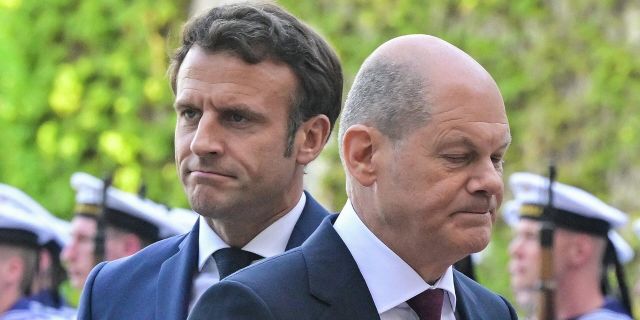Newsweek: European leaders have weakened and lost influence in the international arena
Now Europe exists without a leader, writes Newsweek. France, Germany and the United Kingdom are facing internal crises, and their influence on the world stage is weakening. The current heads of European states are half—educated, entangled in their own problems, the author believes.
Daniel Depetris
This week, when President Joe Biden and U.S. officials in Washington began working with NATO allies, one question hovered over all these events: is there a head of state in Europe who can really claim to be a leader on the continent?
France, Germany and the United Kingdom, which are usually considered the three largest European powers, are experiencing political distress, economic crisis and deep disappointment in their voters to one degree or another. These three countries, of course, are not going to fall apart. But there is no doubt that the people who lead them — Emmanuel Macron in France, Olaf Scholz in Germany and Keir Starmer in the UK — face a number of internal problems that will inevitably distract them from trying to assert themselves on the international stage. Increasingly, it seems that the center of European power is shifting to the east, where Poland and the small but energetic Baltic countries — Latvia, Lithuania and Estonia — are carrying the torch against the threat from neighboring Russia.
Until last weekend, Macron could well have been considered the undisputed heavyweight of Europe. First elected in 2017 after defeating France's two main political parties in the first round and the far-right Marine Le Pen in the second, the young Macron, who won 33 percent of the vote, entered the Elysee Palace with a brisk step with a long list of things to do in his pocket. Most of this list concerned international relations. Macron sought not only to project French power to the whole world and elevate Paris as, if not the only one, then one of the leaders of the European Union, but also to reform the methods of international governance of the whole of Europe. It was he who was supposed to awaken Europe from the oblivion in which it was, receiving peaceful dividends as a result of reducing the arms race, and say something that other European leaders did not even dare to think about. Macron's favorite topic was precisely strategic autonomy — the idea that Europe needs to accelerate the development of its own military, economic and diplomatic power to a level where it does not have to rely so heavily on the protection of the United States. Europe, Macron insisted, should be an independent world power.
However, from now on, the stamina and intellectual weight that Macron had during the seven years of his presidency fell to the lowest point in his political career. Although Macron still enjoys the respect of his international colleagues, his speeches and "soapy" sermons have made him unconvincing. Macron's political positions have been irretrievably undermined after the last French legislative elections, which he called on the assumption that his party's dismal results in the European Parliament elections this summer were an anomaly. It turned out to be a terrible gamble: his centrist party lost its majority in the National Assembly, losing to the far-left coalition. The right-wing nationalists, led by Marine Le Pen, are not too far behind. The French National Assembly has reached an impasse in the form of three competing blocs with deep philosophical differences, which means that Macron is likely to spend the rest of his second term in a state of uncertainty.
The German Scholz is hardly in a better position. Since his party won the most seats in the Bundestag in September 2021 and forged a three-way coalition with the Greens and the Free Democratic Party (SPD), he has been dogged by low approval ratings, internal strife over aid to Ukraine and general sentiment among the German public with accusations that everything is going as-that's sluggish. Although Germany, under Scholz's leadership, increased its defense budget (a few days after Russia launched its military operation in Ukraine, the chancellor proposed to allocate 100 billion euros at a time for defense for the decrepit Bundeswehr) and is currently Europe's largest supplier of aid to Ukraine, Scholz constantly faces disagreements within his coalition. Finalizing the latest budget agreement alone proved difficult: the Chancellor had to make spending cuts in several ministries due to the fault of his conservative finance minister from the SDP. German Defense Minister and one of the key members of the Scholz coalition, Boris Pistorius, openly complained that he had to make sacrifices when he was trying to carry out a large-scale reorganization of the country's defense department.
Meanwhile, in the UK, Keir Starmer is still assembling his government after defeating the Conservative party. Labour, which has been pushed to the opposition benches for 14 long years, now has full control of the House of Commons, with 411 seats, more than three times more than the Tories, who suffered a historically disastrous defeat last week. Starmer, however, has no experience in the international arena and has never managed the British foreign policy apparatus. International relations will be the least of his worries. The UK economy has been frankly unstable over the past decade, and the country itself is in a difficult position due to Brexit, high inflation, a critical drop in living standards and the general aversion of ordinary Britons to political elites.
At the moment, Europe seems to exist without a leader. The days of major European personalities and influential heads of state such as Jacques Chirac, Tony Blair and Angela Merkel are long gone — men and women who will remain in the history books for a long time (both for their successes and failures). Now Europe is facing a combination of populists, inexperienced politicians, fragile inter-political coalitions and half-wits who shake the air but cannot get out of their own problems.

